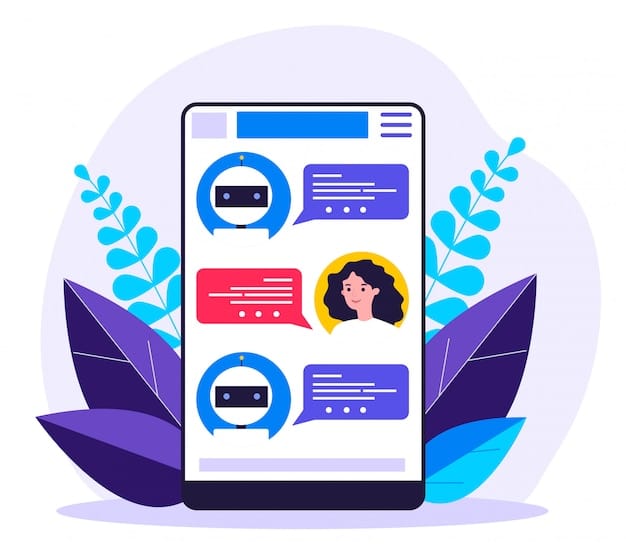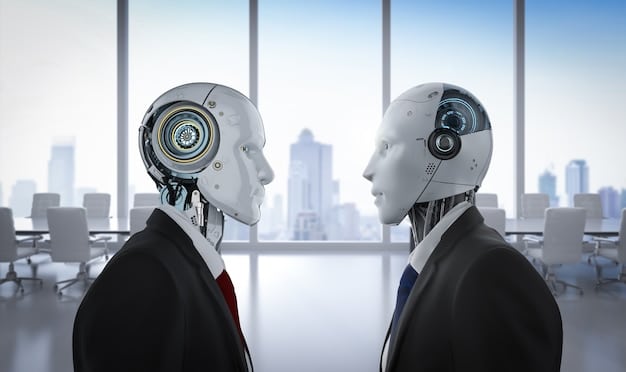AI Automation in US Customer Service: A Landscape Shift

AI-driven automation is transforming the US customer service landscape by enhancing efficiency, personalizing experiences, and reducing operational costs, leading to a more streamlined and responsive service ecosystem.
The integration of AI-driven automation is revolutionizing the US customer service sector, impacting how businesses interact with their clientele and manage service delivery.
Understanding the Rise of AI in US Customer Service
The rise of artificial intelligence (AI) in customer service is no longer a futuristic concept but a present-day reality. In the United States, businesses are increasingly turning to AI-driven automation to enhance customer interactions, streamline operations, and gain a competitive edge.
This adoption is fueled by the potential to provide faster, more personalized, and cost-effective customer service solutions. Understanding the factors driving this trend is crucial for businesses looking to stay relevant in the evolving customer service landscape.
Key Drivers of AI Adoption
Several factors are contributing to the rapid adoption of AI in US customer service. Companies are realizing the immense potential of AI to handle routine tasks, analyze vast amounts of data, and deliver personalized experiences at scale.
Benefits of AI in Customer Service
The benefits of implementing AI in customer service are manifold, ranging from increased efficiency and reduced costs to improved customer satisfaction and enhanced brand loyalty. Let’s delve deeper into these advantages:
- Enhanced Efficiency: AI-powered chatbots and virtual assistants can handle a large volume of customer inquiries simultaneously, reducing wait times and freeing up human agents to focus on more complex issues.
- Reduced Costs: By automating routine tasks and reducing the need for large customer service teams, AI can significantly lower operational costs for businesses.
- Improved Customer Satisfaction: AI can provide personalized and consistent service across all channels, leading to higher customer satisfaction and increased loyalty.
- Data-Driven Insights: AI can analyze customer interactions to identify trends, preferences, and pain points, providing valuable insights for improving products and services.
In conclusion, the rise of AI in US customer service is driven by the need for efficiency, cost reduction, and improved customer experience. Companies that embrace AI are better positioned to meet the evolving needs of their customers and thrive in the competitive market.
AI-Powered Chatbots: Transforming Customer Interactions

AI-powered chatbots are at the forefront of transforming customer interactions in the US. These virtual assistants are capable of engaging with customers in real-time, providing instant support and resolving common issues efficiently.
Their ability to understand natural language and provide personalized responses makes them an invaluable tool for businesses seeking to enhance customer satisfaction and streamline communication.
How Chatbots Work
Chatbots utilize natural language processing (NLP) and machine learning (ML) algorithms to understand and respond to customer inquiries. They can be programmed to handle a wide range of tasks, from answering frequently asked questions to guiding customers through complex processes.
Benefits of Using Chatbots
The benefits of using chatbots in customer service are numerous, including increased efficiency, reduced costs, and improved customer satisfaction. Here’s a breakdown of these advantages:
- 24/7 Availability: Chatbots can provide support around the clock, ensuring that customers always have access to assistance, regardless of the time of day.
- Instant Responses: Chatbots can provide immediate answers to common questions, eliminating the need for customers to wait on hold or send emails.
- Personalized Interactions: Chatbots can be programmed to personalize interactions based on customer data, providing tailored recommendations and support.
- Scalability: Chatbots can handle a large volume of inquiries simultaneously, making them ideal for businesses experiencing high customer traffic.
In summary, AI-powered chatbots are revolutionizing customer interactions by providing instant, personalized, and efficient support. Their ability to handle a wide range of tasks and provide 24/7 availability makes them an essential tool for businesses looking to improve customer satisfaction and streamline communication.
Personalized Customer Experiences with AI
AI is enabling businesses to deliver highly personalized customer experiences by analyzing vast amounts of data and tailoring interactions to individual preferences. This level of personalization can lead to increased customer satisfaction, loyalty, and ultimately, higher revenue.
Understanding how AI facilitates personalized experiences is crucial for businesses looking to differentiate themselves in the competitive market.
Data-Driven Personalization
AI algorithms can analyze customer data, such as purchase history, browsing behavior, and demographic information, to create personalized profiles. These profiles can then be used to tailor interactions across all channels, from email marketing to customer service interactions.
AI-Enabled Recommendations
AI can also be used to provide personalized product and service recommendations based on customer preferences and past behavior. This can help customers discover new products and services that they may be interested in, increasing sales and customer satisfaction.
Examples of Personalized Customer Experiences
Several companies are already leveraging AI to deliver personalized customer experiences. Here are some examples:
- Netflix: Uses AI to recommend movies and TV shows based on viewing history and preferences.
- Amazon: Uses AI to provide personalized product recommendations and targeted advertising.
- Spotify: Uses AI to create personalized playlists and recommend new music based on listening habits.
In conclusion, AI is transforming customer service by enabling businesses to deliver highly personalized experiences. By leveraging data-driven insights and AI-enabled recommendations, companies can create more engaging and satisfying interactions, leading to increased customer loyalty and revenue.
The Impact on Customer Service Jobs in the US

The integration of AI in customer service raises questions about its impact on customer service jobs in the US. While some fear that AI will lead to widespread job displacement, the reality is more nuanced. AI is likely to augment rather than completely replace human agents, creating new opportunities and transforming existing roles.
Understanding the potential impact of AI on the job market is essential for businesses, employees, and policymakers alike.
AI as an Augmentation Tool
AI can automate routine tasks, freeing up human agents to focus on more complex and strategic issues. This can lead to increased productivity and job satisfaction for employees, as they are able to focus on tasks that require creativity, empathy, and critical thinking.
New Job Opportunities
The implementation and maintenance of AI systems will create new job opportunities in areas such as AI development, data analysis, and customer experience design. These roles will require specialized skills and knowledge, providing opportunities for individuals with the right training and education.
Reskilling and Upskilling Initiatives
To prepare for the changing job market, it is essential to invest in reskilling and upskilling initiatives that help employees develop the skills needed to work alongside AI systems. This includes training in areas such as data analysis, customer service, and technology management.
Consider these points:
- AI will automate routine tasks, allowing human agents to focus on more complex issues.
- New job opportunities will emerge in AI development and data analysis.
- Reskilling and upskilling initiatives are crucial for preparing employees.
In summary, the impact of AI on customer service jobs in the US will be transformative, but not necessarily negative. By embracing AI as an augmentation tool, investing in reskilling initiatives, and creating new job opportunities, businesses can ensure that AI benefits both employees and customers.
Challenges & Considerations for AI Implementation
While the benefits of AI in customer service are clear, there are also challenges and considerations that businesses must address to ensure successful implementation. These include data privacy concerns, ethical considerations, and the need for ongoing monitoring and optimization.
Addressing these challenges is crucial for building trust with customers and maximizing the value of AI investments.
Data Privacy and Security
AI systems rely on vast amounts of customer data, raising concerns about data privacy and security. Businesses must implement robust security measures to protect customer data from unauthorized access and ensure compliance with data privacy regulations.
Ethical Considerations
The use of AI in customer service raises ethical considerations, such as bias in AI algorithms and the potential for manipulation. Businesses must ensure that AI systems are fair, transparent, and accountable, and that they do not perpetuate harmful stereotypes or discriminate against certain groups of customers.
The Importance of Human Oversight
While AI can automate many customer service tasks, it is essential to maintain human oversight to ensure that AI systems are functioning properly and that customer issues are resolved effectively. Human agents can provide empathy, creativity, and critical thinking skills that AI systems may lack.
Key items to remember:
- Address data privacy and security concerns.
- Ensure AI systems are ethical and unbiased.
- Maintain human oversight to address complex issues.
In conclusion, while the benefits of AI in customer service are undeniable, businesses must carefully consider the challenges and ethical implications associated with its implementation. By addressing these challenges proactively, companies can build trust with customers and ensure that AI is used responsibly and effectively.
Future Trends in AI-Driven Customer Service
The future of AI-driven customer service is bright, with new technologies and applications emerging constantly. From more sophisticated chatbots to AI-powered predictive analytics, the potential for AI to transform customer interactions is only just beginning to be realized.
Staying abreast of these trends is crucial for businesses looking to maintain a competitive edge and provide the best possible customer experience.
Predictive Analytics and Proactive Support
AI can analyze customer data to predict future needs and proactively address potential issues before they arise. This can lead to increased customer satisfaction and reduced service costs.
Voice AI and Conversational Interfaces
Voice AI and conversational interfaces are becoming increasingly sophisticated, enabling customers to interact with businesses using natural language. This can make customer service interactions more intuitive and convenient.
AI-Powered Personalization at Scale
As AI technology evolves, businesses will be able to deliver even more personalized customer experiences at scale. This will involve leveraging AI to understand individual customer preferences and tailoring interactions to meet their specific needs.
Looking Ahead:
- Predictive analytics will enable proactive customer support.
- Voice AI will create more natural conversational interfaces.
- Personalization will be enhanced through AI-driven insights.
In summary, the future of AI-driven customer service is characterized by predictive analytics, voice AI, and enhanced personalization. Companies that embrace these trends and invest in AI technology will be well-positioned to deliver exceptional customer experiences and thrive in the evolving market.
| Key Point | Brief Description |
|---|---|
| 🤖 AI Chatbots | Enhance customer interactions with 24/7 instant support. |
| 🔏 Data Privacy | Critical to protect customer data and maintain trust. |
| 💼 Job Impact | AI augments roles, creating new opportunities and requiring upskilling. |
| 📈 Future Trends | Expect more personalization, predictive analytics, and voice AI. |
Frequently Asked Questions
AI is used via chatbots for instant support, analyzing customer data for personalized recommendations, and automating routine tasks. These applications enhance efficiency and improve customer satisfaction across various industries.
The main benefits include 24/7 availability, reduced operational costs, personalized interactions, and the ability to handle high volumes of inquiries. This leads to better customer experiences and increased customer loyalty.
AI is expected to augment customer service jobs, not replace them entirely. It automates routine tasks, allowing human agents to focus on more complex issues. New roles in AI development and data analysis are also emerging.
Key challenges include ensuring data privacy and security, addressing ethical considerations like algorithm bias, and maintaining human oversight. Ongoing monitoring and optimization are also essential for success.
Expect more predictive analytics for proactive support, sophisticated voice AI for natural conversational interfaces, and personalization at scale. These trends will improve customer engagement and drive business growth.
Conclusion
In conclusion, AI-driven automation is significantly reshaping the US customer service landscape by boosting efficiency, personalizing interactions, and reducing operational costs, but its successful implementation requires careful consideration of ethical implications and a focus on reskilling the workforce to leverage AI’s capabilities effectively.





